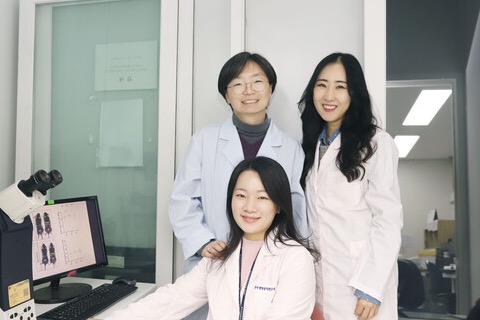Korean researchers have analyzed the effects of nanolastics on the metabolism of offspring.

The Korea Research Institute of Bioscience and Biotechnology (KRIBB) said its research team, led by Dr. Lee Da-yong of the Center for Rare and Difficult Diseases, has found that nanoplastics are transferred to the next generation through breast milk, causing offspring to gain abnormal weight.
It added that the study will likely be used to provide new approaches for the prevention and treatment of childhood obesity and the scientific basis for policies and systems to address microplastic pollution.
Microplastics of a size of 5 mm or less are not filtered during sewage treatment and flow directly into rivers and oceans, causing environmental problems and adverse effects on people who directly or indirectly ingest them.
Nanoplastics are plastic particles formed by splitting microplastics and are very small, measuring 1 μm (micrometer, one-millionth of a meter) or less, making them almost impossible to observe or detect.
Recently, microplastics have emerged as a societal issue, and many studies have been conducted on their effects on the environment and people. Still, the effects of microplastics on generations of offspring have been poorly understood.
The researchers found in a mouse model that nanoplastics induce changes in maternal breast milk composition, and their offspring develop abnormal lipid metabolism and altered gut microbiome, leading to abnormal weight gain.
The researchers observed that the offspring of mothers exposed to polystyrene (PS) and polypropylene (PP) nanoplastics exhibited significant increases in weight and body fat despite no increase in growth hormone secretion or intake.
Analysis of the mothers' breast milk showed an increase in LPC (lysophosphatidylcholine) and a decrease in PC (phosphatidylcholine), a lipid component highly associated with obesity. Similar changes were found in the blood of the offspring who consumed the milk.
When the lipid composition changes induced by nanoplastics were suppressed by modulating the activity of related enzymes, the weight gain of the offspring was restored to normal.
Also, the offspring exposed to nanoplastics showed a similar distribution in their gut microbiome to that seen in obesity. Bifidobacterium Pseudolongum and Phocaeicola vulgatus, known to have anti-obesity effects, were significantly reduced.
"For the first time, we have metabolically identified a possible link between microplastics and childhood obesity," Dr. Lee said. "In-depth follow-up studies and investigations will be needed to determine the amount of nanoplastics and biological effects of exposure in patients with actual related diseases."
The study was published on Feb. 24 in the online edition of Environment International (IF 11.8), a leading journal in the environmental field titled “Maternal nanoplastic ingestion induces an increase in offspring body weight through altered lipid species and microbiota.”

